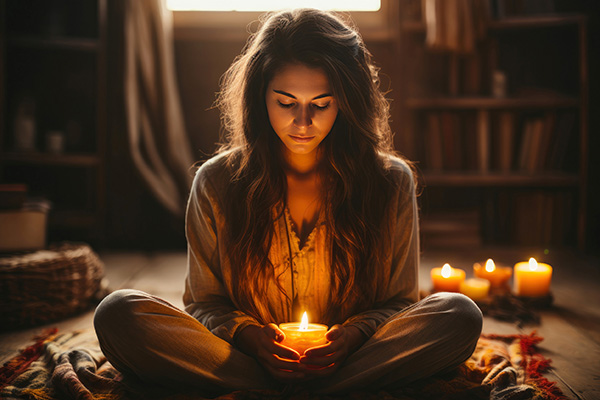journaling
Why Manifestation (Sometimes) Doesn’t Work
 For many years, manifestation has been a buzzword in the spiritual community. An array of manifestation gurus advise us every day to journal, set intentions, clear our chakras, consult our pendulums, visualize our wishes and goals as if they are already real, and maintain a “high vibe” energy.
For many years, manifestation has been a buzzword in the spiritual community. An array of manifestation gurus advise us every day to journal, set intentions, clear our chakras, consult our pendulums, visualize our wishes and goals as if they are already real, and maintain a “high vibe” energy.
In theory, this should bring our desires into manifested form. But wha tif we do all the right things…and still, nothing happens?
If you’ve ever felt deflated after months, even years of affirmations, vision boards, visualized meditations, crystal grids, and candle lighting rituals, you’re not alone. There are real reasons why manifestation doesn’t always work the way we expect.
Years ago, a young man called me for a reading, utterly discouraged. He’d been practicing the Law of Attraction for months with no results.
“I still don’t have a Porsche in my driveway,” he said flatly. “This manifestation thing just doesn’t work.”
So, I asked him, “What have you actually done to get the Porsche?”
He looked confused. “Well, I’ve visualized it. I’ve journaled about it. I imagine myself driving it every night before I fall asleep. But it’s still not there.”
I smiled and said, “That’s a great start. But what else have you done?”
Confused silence.
That’s when I explained: manifestation isn’t just about imagining or magic. It’s about alignment. You can affirm, wishlist and believe all you want, but if your daily choices, habits, and actions aren’t in harmony with your vision, the energy stalls.
The Simple Secret To Building Real Confidence
 Building your confidence can feel vague or out of reach, like something you’re supposed to just know how to do, but often we don’t.
Building your confidence can feel vague or out of reach, like something you’re supposed to just know how to do, but often we don’t.
The typical advice is to do affirmations, spoken aloud or posted around your home, along with journaling and gratitude practices.
While these practices can help us cultivate things like intuitive awareness, inner peace or emotional balance, they aren’t always the most effective confidence builders.
There is one essential step we must take if we want to build genuine, lasting confidence. That step is action.
It’s easy to wait for confidence to arrive like a bolt of lightning, expecting it to empower us and prepare us to finally walk the empowered path of our dreams.
But the reality is that confidence doesn’t simply appear before the journey begins. It actually grows as we move forward.
Taking action can feel intimidating. You may not feel ready. You might believe you need more time, more clarity, or more skills. But readiness doesn’t magically arrive.
Change begins when we choose to take action, even if it’s imperfect. Manifestation requires more than thought and feeling. It calls for aligned, inspired action.
Spiritual Strategies For A Loving Relationship
 Over the years I have worked with many clients who either want to improve an existing relationship or manifest a new relationship.
Over the years I have worked with many clients who either want to improve an existing relationship or manifest a new relationship.
In my readings, I have seen that most of us carry patterns, energy blocks, or emotional knots that quietly affect our love lives. Many people describe the same inner cycle: a longing for deeper connection followed by fear, self-doubt, and frustration.
Depending on the needs to the particular individual or couple, I often recommend a few simple yet powerful practices that can shift the romantic energy field and open the heart.
These practices are gentle and effective, working not just on the emotional level but on the spiritual and energetic levels as well. They help clients reconnect with their inner wisdom and realign with love.
We tend to overthink our love lives. We analyze our relationships from every angle, hoping to find the answers in logic.
But love is not a puzzle to be solved. It is a frequency to be attuned to. And when we work with spiritual tools, we allow ourselves to rise above the clutter of thought and enter a state of clarity and openness.
I have found that the following practices, when done consistently, create a soft and supportive foundation for emotional healing and soulful connection. They do not require dramatic effort or complex rituals. They are simple shifts in intention and awareness that can lead to powerful outcomes.
The Manifesting Power Of Mindful Mornings
 Mornings are special. The energy of the morning is different than at any other time. When the sunlight is still fresh and gentle, the world is calm and quiet, there is a magic to this time. There is a softness that invites clarity, a gentle nudge from the universe to begin again, to step into a new day with intention and grace.
Mornings are special. The energy of the morning is different than at any other time. When the sunlight is still fresh and gentle, the world is calm and quiet, there is a magic to this time. There is a softness that invites clarity, a gentle nudge from the universe to begin again, to step into a new day with intention and grace.
The first few moments of our day help to set the tone for our experiences throughout. Becoming aware and attuned to this fresh universal energy can be as simple as creating a small morning routine.
Now, I realize not everyone loves the morning as much as I do. If this is the case for you, the idea of creating a morning routine may not sound appealing at all. Starting with small, quick steps can make all the difference here.
Your morning routine is meant to set you up for success. It is about doing things you like in the morning, that get you in the right frame of mind and heart.
Bringing a bit of mindfulness into your morning can set you up energetically to respond more effectively to your experiences throughout the day.
Below is a list of things you can do in the morning to create a personalized routine that works for you. You certainly don’t have to do all them! Just pick one or two to get started and build from there. While consistency is important, if something is not working for you, change it up and try something new. This routine should be fulfilling and meaningful to you.


